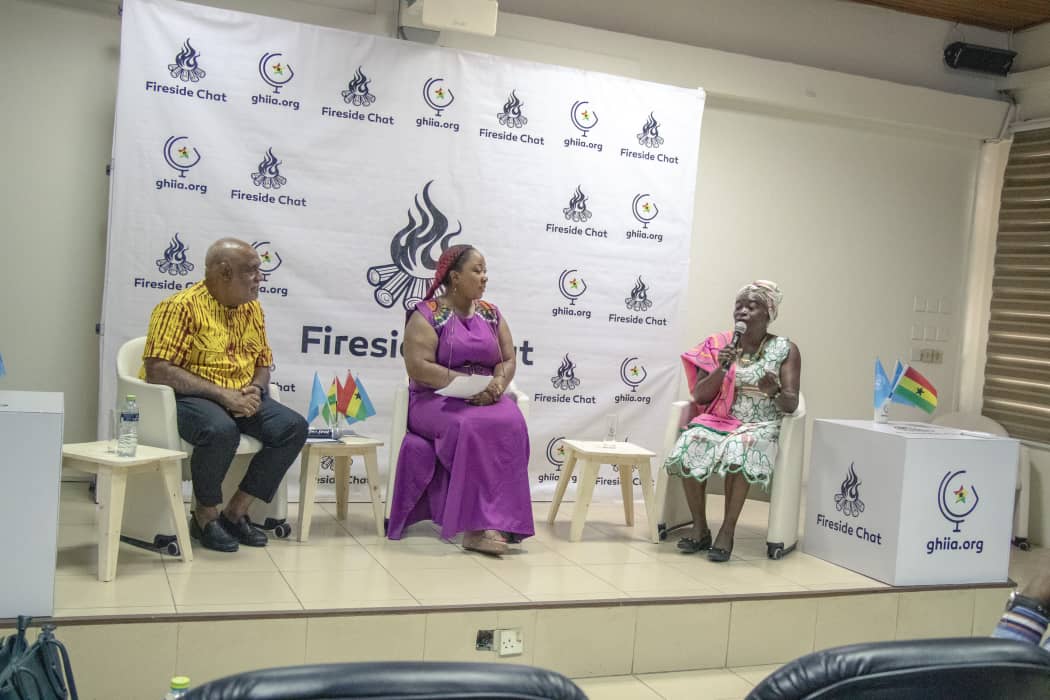
Ghana leads the way as the UN’s largest contributor of Women Peacekeepers
Ghana has been lauded as an example of extreme progress on SDG 5 in Africa, with significant achievements including contributing the largest number of female peacekeepers to the UN.
This was emphasized by His Excellency Mr. Charles Abani, United Nations (UN) Resident Coordinator to Ghana. Mr. Abani was speaking at a “Bugum” organized in his honour by the Institute of International Affairs, Ghana (GhIIA.org). “Bugums” are fireside chats by the Institute where leading players in Ghana’s International Relations and Global Affairs are able to share recollections and lessons from their careers and experiences for development.
This edition was on the theme “Global Arrangements to Promote Women Empowerment: The Role of the UN”.
The event was heavily patronized with an audience comprising female students from Junior High School through to tertiary institutions, members of the diplomatic corps, Civil Society Organizations and the general public.
Speaking at the event, H.E Charles Abani, outlined a succinct but easy-to-understand overview of the Sustainable Development Goal 5 of the UN; which is focused on gender equality. He noted that the UN through its 35 agencies in Ghana, and within the structure of the partnership framework with the Government of Ghana, was heavily focused on women's empowerment and growth.
He lauded Ghana’s efforts in maintaining peace, harmony and dignity of women, even though the occasional localized conflicts and regional flare-ups in neighbouring countries could undermine Ghana’s total efforts.
Commenting on “DigitALL: Innovation and Technology for Gender Equality”, the theme for International Women’s Day 2023, Mr Abani emphasized the impact of digitization and technology as critical to propel women into leadership via increased access to resources and knowledge.
He said this was built on the positive outcomes and resilience displayed by women during the COVID crisis.
He stated, “a recent UNDP research indicated that women-run businesses thrived during Covid-19. Women reacted positively and were resilient largely because they had built a strong network amidst cash shortage at the peak of the pandemic. If we extend this natural experiment and extrapolate this to the world of politics and business, we can easily see the positive outcomes for us all. With less than 40% of women involved in the digital economy, Ghana and other countries need to do more to correct this to catalyze positive results for the society.”
The Ambassador of the Republic of Suriname to Ghana H.E. Fidelia Graand Galon, who was in attendance participated in the session.
She said, “Gender equality is important. The UN advocates a ‘leave- no -one- behind’, a mantra which should be interpreted as ensuring that all men are carried along to support this agenda, globally.”
The Deputy Head of Mission of the Nigeria High Commission to Ghana, Mr. Aliyu Ndaman also shared his thoughts at the event.
He noted that the challenges faced in Ghana are similar to those faced in Nigeria. He stated that in many rural communities in both countries, young women are forced to prioritize marriage over their education.
He said in his personal experience, this has changed in his community as the men in his community led the change for equality in terms of access to education.
Mr. Ndaman said, “I personally encouraged my wife to further her education, despite society's pressure and we are all the better for it”. Men must lead the change for gender equality. We in Nigeria are further propelled to promote this when we consider the examples of Madam Ngozi Okonjo-Iweala, currently the Director-General of the WTO and Madam Amina Mohammed, currently the Deputy Secretary-General of the United Nations”.
